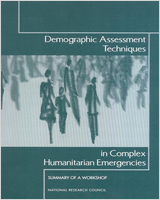NCBI Bookshelf. A service of the National Library of Medicine, National Institutes of Health.
The Roundtable on the Demography of Forced Migration was established by the Committee on Population of the National Research Council in 1999. The roundtable is composed of experts from academia, government, philanthropy, and international organizations. The roundtable's purpose is to serve as an interdisciplinary, nonpartisan focal point for taking stock of what is known about demographic patterns in refugee situations, to apply this knowledge base to assist both policy makers and relief workers, and to stimulate new directions for innovation and scientific inquiry in this growing field of study.
The roundtable meets yearly and has also organized a series of workshops (held concurrently with roundtable meetings) on some of the specific aspects of the demography of refugee and refugee-like situations, including mortality patterns, demographic assessment techniques, and research ethics in complex humanitarian emergencies.
This report to the Roundtable on the Demography of Forced Migration is a summary of one such workshop, which was held on September 20-21, 2000, under the aupices of the Committee on Population. The purpose of this meeting was to address a basic problem faced by all humanitarian relief agencies in an emergency: how to count the numbers of displaced persons and assess their general well-being. Workshop participants examined different methods for estimating refugee populations and their mortality rates, whether mortality was due to disease and malnutrition or human rights abuses. Demographic Assessment Techniques in Complex Humanitarian Emergencies: Summary of a Workshop explores the applicability of various methods in different types of emergency settings, how to improve existing methodologies and develop new ones, and the difficulties encountered by personnel in the field, including security, logistics, and access to a population.
Contents
Rapporteur: Holly Reed.
This study was supported by a grant to the National Academy of Sciences by the Andrew W. Mellon Foundation. Any opinions, findings, conclusions, or recommendations expressed in this publication are those of the author and do not necessarily reflect the views of the organization that provided support for the project.
Suggested citation:
National Research Council (2002). Demographic Assessment Techniques in Complex Humanitarian Emergencies: Summary of a Workshop. Holly Reed, Rapporteur, Roundtable on the Demography of Forced Migration, Committee on Population. Washington, DC: National Academy Press.
NOTICE: The project that is the subject of this report was approved by the Governing Board of the National Research Council, whose members are drawn from the councils of the National Academy of Sciences, the National Academy of Engineering, and the Institute of Medicine. The members of the committee responsible for the report were chosen for their special competences and with regard for appropriate balance.
- NLM CatalogRelated NLM Catalog Entries
- Demographic Assessment Techniques in Complex Humanitarian EmergenciesDemographic Assessment Techniques in Complex Humanitarian Emergencies
Your browsing activity is empty.
Activity recording is turned off.
See more...
